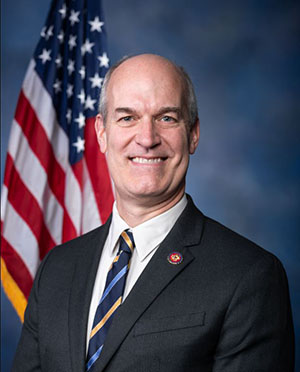||| FROM REP. RICK LARSEN’S OFFICE |||

WASHINGTON, D.C. – Today, Rep. Rick Larsen (WA-02) urged Congress to address the continued public health crisis and deliver real relief for Washingtonians, families and small businesses. In a letter to House and Senate leadership, Larsen outlined his top priorities for any upcoming pandemic relief legislation.
“With a third wave of COVID-19 spreading across the country, passing a comprehensive federal relief package grows more urgent by the day,” Larsen wrote. “Limits on gatherings and economic activity are necessary to protect public health and save lives but continue to cause real hardship for families nationwide. A strong public health response will enable a sustainable economic recovery.”
You can read the full letter here and below:
Dear Speaker Pelosi, Minority Leader McCarthy, Majority Leader McConnell and Minority Leader Schumer:
With a third wave of COVID-19 spreading across the country, passing a comprehensive federal relief package grows more urgent by the day. Limits on gatherings and economic activity are necessary to protect public health and save lives but continue to cause real hardship for families nationwide. A strong public health response will enable a sustainable economic recovery.
Given the breadth of the challenge posed by COVID-19, an effective relief bill will need to be comprehensive, like the two versions of the HEROES Act the House has already passed. Based on my conversations with local families, business owners and community leaders, my priorities for a long-overdue relief bill are:
• Increased federal unemployment assistance
The $600 increase in federal unemployment benefits in the CARES Act was a lifeline for millions of out-of-work Americans. The additional weekly payments helped families afford rent and mortgage payments and keep food on the table. As cases are projected to continue to rise, more Americans will likely face layoffs or reduced hours without knowing when they may be able to return to work. Congress must reinstate increased and expanded federal unemployment assistance.
• Support essential workers at state, local, tribal and territorial governments
The deadline for spending Coronavirus Relief Fund (CRF) allocations is December 31, 2020, but the public health need is ongoing. According to the Snohomish Health District, failure to extend the spending deadline will force layoffs of temporary staff. These furloughs will limit Snohomish County’s ability to do contact tracing which will harm public health, businesses and schools. This deadline must be extended and funds for state, local, tribal and territorial government must be renewed to ensure an appropriate pandemic response. Additionally, CRF dollars were limited in their use. In order to support essential workers on the frontline of the pandemic, additional funding for revenue replacement must be provided to state, local, tribal and territorial governments. Without this flexible relief, local governments will be forced to lay off workers who are essential to the safety of their communities. In addition, funding should be set aside for communities along the Canadian border that have been financially devastated by the months-long closure.
• Fight hunger
According to Food Lifeline, the need for food in Washington state has nearly doubled since the pandemic began. In Skagit County alone, the Helping Hands Food Bank has distributed 725,000 pounds of food to more than 70,000 individuals and the need for nutritional assistance continues to grow. The USDA Farmers to Families Food Box program is another unique initiative to support farmers, food banks and families with local produce. The Puget Sound Food Hub used $400,000 in USDA funds to distribute nearly 19,000 boxes to local families in need. However, the most recent round of funding was limited, and the contract was not renewed. Congress must invest in these programs to support producers, food banks and hungry constituents. In addition, COVID-19 relief legislation should include the provisions from the HEROES Act to expand the monthly SNAP benefit by 15 percent and boost funds for vital nutrition programs to improve families’ access to healthy, nutritious meals.
• Protect essential workers
Frontline workers are essential to protecting Americans from COVID-19 but are also at a heightened risk of contracting the virus. In Washington state, 25 percent of all COVID-19 cases are people who work in health care and social assistance, the most of any industry sector. Congress needs to support these workers by ensuring they have the tools and training to do their jobs safely. To keep all workers safe, the next COVID-19 bill should include provisions protecting workers who report infection control issues and requiring the Occupational Safety and Health Administration to develop safe workplace standards.
• Ensuring school safety
As school districts continue to assess in-person, online or hybrid education, Congress should help students, teachers and staff meet urgent needs such as cleaning, acquiring protective equipment and accessing technology (software, hardware and broadband). Districts opting for a hybrid or in-person model continue to incur significant costs for the personal protective equipment and sanitizing equipment necessary for a safe return to school. Reliance on remote learning revealed inequities in access to high-speed internet and computers. Arlington School District staff, for example, estimated 20 percent of students lacked adequate internet access for distance learning at the beginning of the school year. The costs of providing students with appropriate technology and internet access and training teachers on how best to use that technology are substantial. In the Oak Harbor School District, these technology costs alone exceeded the district’s $700,000 CARES Act ESSER funding distribution.
• Support the devastated aviation and aerospace industries
In the Pacific Northwest, the aviation manufacturing workforce drives the local economy and helps the U.S. remain globally competitive. As the pandemic continues, this industry faces stalled production and deliveries, financial harm and mass layoffs. Congress must include my bipartisan legislation, the Aviation Manufacturing Jobs Protection Act of 2020, in the next COVID-19 relief bill to help prevent aerospace supply chain furloughs and rehire employees furloughed due to the pandemic. I also urge Congress to extend the Payroll Support Program, which saved 950,000 aviation jobs across the country.
• Emergency funding for child care
With many school districts opting for remote learning, child care is emerging as a critical issue during the pandemic. A National Women’s Law Center report found that more than 1.1 million workers left the workforce in September, of whom 80 percent were women. Many parents, including essential workers, have made the difficult choice to stay home to look after children who are learning remotely. Reliable, affordable child care will keep kids safe during the pandemic and enable parents to re-enter the workforce.
• Support equitable vaccine distribution
With multiple COVID-19 vaccine candidates under Food and Drug Administration review, Congress and the executive branch need to work together to ensure vaccine distribution goes smoothly. Nationwide distribution of a new vaccine will require an unprecedented public health campaign and states will need additional resources to ensure success. Given the scope of this immunization program, states will need funding to hire temporary workforce, transport and store doses, and conduct a massive outreach campaign. Any vaccine must be free of charge to ensure cost is not a barrier to protection from COVID-19.
My constituents have additional urgent needs. Another round of Paycheck Protection Program funding, with improvements reflecting lessons learned on transparency and simplified forgiveness, will help prevent layoffs and keep people off unemployment. Congress should also ensure any stimulus payments are broader by including dual status families, filers who use an Individual Taxpayer Identification Number and adult dependents. Further, the bill should include funding for the United States Postal Service and housing assistance.
COVID-19 spreads exponentially. Every single day Congress waits to pass a relief package makes the challenge greater. Congress must pass a comprehensive bill that eases the burden on struggling Americans and focuses relief on communities most acutely impacted by the pandemic. The American people are sacrificing greatly to combat the pandemic and are counting on Congress to do its part.
The time to act is long overdue.
**If you are reading theOrcasonian for free, thank your fellow islanders. If you would like to support theOrcasonian CLICK HERE to set your modestly-priced, voluntary subscription. Otherwise, no worries; we’re happy to share with you.**






